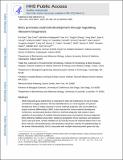Bmi1 Promotes Erythroid Development Through Regulating Ribosome Biogenesis
Author(s)
Gao, Rui; Chen, Sisi; Kobayashi, Michihiro; Yu, Hao; Zhang, Yingchi; Wan, Yang; Young, Sara K.; Yu, Ming; Vemula, Sasidhar; Fraenkel, Ernest; Cantor, Alan; Antipin, Yevgeniy; Xu, Yang; Yoder, Mervin C.; Wek, Ronald C.; Ellis, Steven R.; Kapur, Reuben; Zhu, Xiaofan; Liu, Yan; Soltis, Anthony Robert; ... Show more Show less
DownloadFraenkel_Bmi1 promotes.pdf (1.206Mb)
OPEN_ACCESS_POLICY
Open Access Policy
Creative Commons Attribution-Noncommercial-Share Alike
Terms of use
Metadata
Show full item recordAbstract
While Polycomb group protein Bmi1 is important for stem cell maintenance, its role in lineage commitment is largely unknown. We have identified Bmi1 as a novel regulator of erythroid development. Bmi1 is highly expressed in mouse erythroid progenitor cells and its deficiency impairs erythroid differentiation. BMI1 is also important for human erythroid development. Furthermore, we discovered that loss of Bmi1 in erythroid progenitor cells results in decreased transcription of multiple ribosomal protein genes and impaired ribosome biogenesis. Bmi1 deficiency stabilizes p53 protein, leading to upregulation of p21 expression and subsequent G0/G1 cell cycle arrest. Genetic inhibition of p53 activity rescues the erythroid defects seen in the Bmi1 null mice, demonstrating that a p53-dependent mechanism underlies the pathophysiology of the anemia. Mechanistically, Bmi1 is associated with multiple ribosomal protein genes and may positively regulate their expression in erythroid progenitor cells. Thus, Bmi1 promotes erythroid development, at least in part through regulating ribosome biogenesis. Ribosomopathies are human disorders of ribosome dysfunction, including Diamond-Blackfan anemia (DBA) and 5q− syndrome, in which genetic abnormalities cause impaired ribosome biogenesis, resulting in specific clinical phenotypes. We observed that BMI1 expression in human hematopoietic stem and progenitor cells from patients with DBA is correlated with the expression of some ribosomal protein genes, suggesting that BMI1 deficiency may play a pathological role in DBA and other ribosomopathies.
Date issued
2015-02Department
Massachusetts Institute of Technology. Department of Biological EngineeringJournal
Stem Cells
Publisher
Wiley Blackwell
Citation
Gao, Rui, Sisi Chen, Michihiro Kobayashi, Hao Yu, Yingchi Zhang, Yang Wan, Sara K. Young, et al. “Bmi1 Promotes Erythroid Development Through Regulating Ribosome Biogenesis.” Stem Cells 33, no. 3 (February 17, 2015): 925–938.
Version: Author's final manuscript
ISSN
10665099
1549-4918